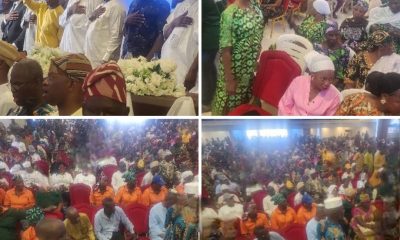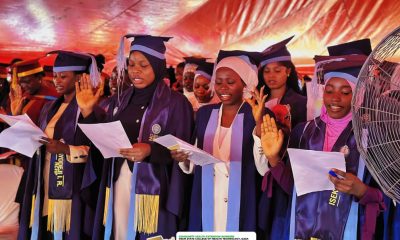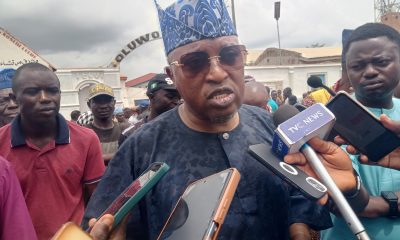News
Nigerian Politics: What Do Political Godfathers And Their Godsons Really Want?

By Thompson Taiwo
Nigeria’s political ecosystem is akin to an eye-catching drama series full of twists and turns. Its plots telling; its climaxes copious as long as politics is a game of interests, intrigues, serial betrayals and elastic loyalty. Its players’ typical tactics often elevate cut-throat strategies, vicious mudslinging and other desperate gambits above the errands of power which their frequently rancorous partisan struggles are ultimately meant to achieve. One of the issues that often heat up Nigeria’s political stratosphere is the habitual acrimonious relationship between the political godfather and his godson which is often tied to how to share the spoils of power. The current specimen in the series of the godfather-godson’s wars of attrition is the feud between Comrade Adams Oshiomole and Governor Godwin Obaseki which is already reaching its crescendo.
The concept of godfather in a religious milieu strikes a positive note. It symbolizes mentorship and legal guardianship in many Christian denominations. In the Roman Catholic Church, the godparent is a role model to his godchild as he provides spiritual guidance to him. He also attests to the integrity of an individual who is joining the catholic faith. Simply put, he is a positive transferor of moral and spiritual values which a child needs to grow from infancy to adulthood.
Contrastingly, the typical godfather in Nigerian politics is a political gatekeeper and string puller who often operates behind the scenes. He belongs to a mafia that superintends over who gets what, when and how in the chess game of politics. So powerful is he that he can pick up a politically embryonic individual from nowhere and shore up his political capital in the twinkling of an eye in the estimation of the voting public. He stockpiles intimidating financial wherewithal, parades influential contacts within every circle that holds the treadles of power and has access to influential media platforms where he launders the image of his candidate. If he vexes, he can even buy the court and its conscience. Any attempt by the godson to topple or collapse his political base is met with well-founded ruthlessness. To him, politics is a serious business whose unwritten rule demands one hundred percent loyalty. What does the godfather really want from the godson? What are the godson’s wishes?
In Edo State, it was a rosy relationship that went sour. Comrade Adams Oshiomole during his reign as governor appointed Godwin Nogheghase Obaseki as Chairman of the Edo State Economic and Strategy Team in 2009. Convinced that Obaseki was a worthy successor, he anointed him the APC governorship candidate in the 2016 Edo gubernatorial election despite objections from his other godsons who felt they were more deserving of the ticket. Oshiomole was practically the face of the electioneering that led to the emergence of Obaseki as governor.
Obaseki would later have a rocky relationship with his godfather. The meltdown in their relationship peaked immediately after the 2019 general elections when new Edo House of Assembly lawmakers on the platform of the All Progressives Congress (APC) were elected.
Obaseki, taking a cue from a book of political stratagems used by Oshiomole himself to take the wind off the sail of some well-known godfathers in Edo politics during his reign, saw the inauguration of new House of Assembly lawmakers as an opportunity to build his own political structure and clear the way for his re-election. Obaseki went ahead to influence the emergence of a speaker who was loyal to him and an assembly that would pander to his interests and ward off any impeachment move against him. His godfather equally wanted to control the levers of power in the state. Oshiomole was said to have schemed to influence the leadership structure of the new assembly. To the two politicians, it is a battle of self-preservation. It has little or nothing to do with good governance or ideology of progressive governance. What the godfather wants in Edo politics is the sustenance of his political dynasty whereas his godson desires to indemnify his political future and crown himself as the new master tactician of Edo politics. The desire of the Godfather is the also the wish of his godson. One of the well-tested weapons used by many godsons in Nigeria’s history to oust their godfathers is to play the sympathy card by going to town with the narrative that their political benefactors are up in arms against them because they refuse to service their extravagant tastes and huge financial demands with the commonwealth of the people. The masses, the pawns in the powerplay, who were not privy to their clandestine pre-power deal will then choose who to side with. Whereas, the battle, more often than not, is not about achieving better life for the masses.
The inauguration of the nine lawmakers loyal to Governor Obaseki and edging out of the remaining 15 lawmakers loyal to Oshiomole was the last straw that broke the camel’s back. A lawmaker from the Oshiomole camp later defected to the Obaseki’s. The governor has since been working with ten lawmakers. The duo hardly see eye to eye. Oshiomole was suspended by the APC in his own state.
He also the survived the plot to oust him as APC National Chairman on the strength of a court order. He is, however, back to take his pound of flesh from his godson. Many believe he has anointed Pastor Osagie Ize-Iyamu to replace Obaseki as APC governorship candidate in the September 19 Edo gubernatorial election. Ize-Iyamu has been touted to emerge through a controversial direct primary mode the Oshiomole-led National Working Committee (NWC) of the APC has adopted. The ugly developments in Edo politics exemplify the fact that the battle for the soul of Edo is far from being altruistic. Will the godson outwit his godfather in Edo politics? This poser will be ripe for an answer in a couple of weeks.
By the same token, when former governor of Lagos State, Akinwumi Ambode, lost his re-election bid, several reasons were adduced by his detractors within the Lagos APC. Many of the issues raised against him were hardly on his performance in the saddle or the need to achieve better life for Lagosians; his critics foregrounded his alleged disdain for APC faithful, stalwarts and leaders who bankrolled his way to power. His hecklers said he was averse to answering the APC party leaders’ calls or listening to their advice. Some alleged he blossomed into a despot and took some decisions without recourse to his political base. He was equally accused of sacking loyalists of his predecessor from government as well as refusing to pay contractors believed to be loyal to his predecessor. Joe Igbokwe, who was Lagos APC Publicity Secretary during Ambode’s reign, alleged in October 2018 that the former governor’s nonconformity to party politics was responsible for his defeat at the APC primary. While an average Lagosian believed that he deserved a second term based on his performance in office, the hard lesson learnt by Ambode is that performance alone is not a key surety for reelection in this clime. Ambode arguably pulled his weight too early in the day, he overrated his political strength within the Lagos APC family. He forgot that every Lagos governor after Asiwaju Bola Ahmed Tinubu is like a featherweight politician with no grassroots loyalty. All major power switches in the Atlantic state are believed to be loyal to Asiwaju. While Ambode’s wish was to carve his own political niche, his godfather’s desire was to hold on to his bargaining chip in Nigeria’s power market and would brook no emerging threats or opposition. The entire scenario was a battle of selves geared towards aggressively protecting the only thing that gives both sides continued relevance and massages their egos in the Lagos’ power equation.
One of the most interesting godfather-godson feuds in Nigerian politics is the unremitting battle of supremacy between Governor Abduhahi Umaru Ganduje and his erstwhile political father Rabiu Musa Kwankwaso. Before Ganduje parted ways with Kwankwaso, the former was his closest and most trusted ally. He was second in command in the Kwankwasiyya political movement built on the ideals of Mallam Aminu Kano. While leaving office as Kano State governor in 2015, Kwankwaso expressed confidence that the legacy he was leaving behind would be sustained by Ganduje who succeeded him. His confidence then was perhaps bolstered by the fact that they had been political allies since 1992 when they met. They also had for years pulled through Kano’s murky political waters together. Ganduje was Kwankwaso’s deputy governor twice and his personal assistant when he was Minister of Defence under the Obasanjo administration. Not long after Ganduje succeeded his boss as governor in 2015, a bitter political feud broke out between them as Ganduje wanted to become his own man. The first sign of bitterness came to the fore when he allegedly excluded Kwankwaso’s loyalists from his list of cabinet members forwarded to the state’s House of Assembly. Ganduje also wanted to relish the commanding godfather status which his former boss had enjoyed for years. He is the new face of Kano politics today. He wills and deals according to his whims and caprices. The godson’s spat with his one-time political father borders on the struggle between raising a new and alternative powerhouse and salvaging a crumbling movement that once took Kano by the jugular. Again the struggle is hardly about opening up more access to quality education, affordable healthcare, housing and healthy food in Kano. It is about a clash of egos, interests and personalities.
It is safe to say that the wish of the godfather is also the desire of the godson – a reversal of political roles and influences in the power market. Why do the bulk of the masses often throw their weight behind the godson in his virulent battle with his godfather? They often live with the conviction that the godfather is committed to mortgaging their future while the godson is god sent to free them from the throttlehold of his boss and protect their commonwealth from the claws of established pillagers. Regrettably, the sublime roles of godfathers in Nigerian politics have been abused for too long; they are short on mentorship and long on peculiar and self-seeking gains.
However, not all godfathers in Nigerian politics have cancerous influences on the polity but most of them are. In politics today, the godson is an article of trade that must yield shylock-like interests. The principle that defines godfather-godson affair is that whoever controls power controls the cashbox. Therefore, to emerge as the political godfather in this clime, you must take charge of power, hijack the till and hold your critics hostage with tempting pecuniary offers or wield the big stick. That’s what the godfather-godson politics is all about. They don’t care about you but power and its juicy trappings.
Thompson Taiwo is a broadcast journalist. He can be reached via Twitter @thompson_taiwo
-

 News5 days ago
News5 days agoOsun 2026: Former SSG Adeoti, Thousand Of Supporters Declare Support For Adeleke
-

 Education4 days ago
Education4 days ago150 CHEW & JCHEW Graduates of OSCO-HEALTH, Ilesa Inducted into Nigeria’s Community Health Practitioners Board
-

 News4 days ago
News4 days agoCourt Dismisses Suit Challenging Appointment Of Alawo Of Awo, Awards ₦1m Costs
-

 News4 days ago
News4 days agoWoro Massacre: Oluwo Reacts To Low Sympathy, Cautions Tinubu Against Trump’s Intervention


